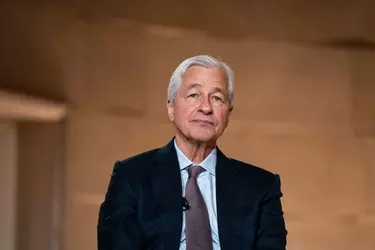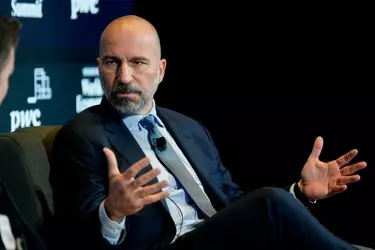Illustration: Daisy Korpics/WSJ, iStock, Pixelsquid
By Chip Cutter
May 11, 2025 11:00 pm ET
Corporate America’s long-running war for talent sounds more like a war on the talent these days.
Not long ago, bosses routinely praised workers as their most prized asset, so much that some hoarded new hires before having enough for them to do. Today, with a giant question mark hanging over the economy, executives are pulling no punches in saying employees need to work harder, complain less and be glad they still have jobs.
“Work-life balance is your problem,” Emma Grede, co-founder of the shapewear company Skims and CEO of clothing label Good American, said this month. After recently cutting more than a 1,000 jobs, Starbucks CEO Brian Niccol said remaining corporate staff needed to step it up and “own whether or not this place grows.” JPMorgan CEO Jamie Dimon, in a profanity-laced internal meeting, told employees lamenting a return-to-work mandate that he didn’t care.
“I’ve had it with this kind of stuff,” he said. “I’ve been working seven days a week since Covid, and I come in, and—where is everybody else?”
The shift in tone marks a shift in power now that companies are shrinking their white-collar staff. With jobs harder to find, many workers are seeing perks disappear and their grievances ignored.

JPMorgan CEO Jamie Dimon. Photo: Al Drago/Bloomberg News
The latest episode happened at a contentious all-hands at Uber last month. The company had just changed the requirements to get a monthlong paid sabbatical to eight years of working at the ride-hail giant, from five years. A decision to require people to work at least three instead of two days in the office also drew complaints. CEO Dara Khosrowshahi suggested those unhappy with the changes deal with it.
“We recognize some of these changes are going to be unpopular,” he said in comments originally reported by CNBC. “This is a risk we decided to take.”
How much more license do bosses have to talk tough to staff? Take the outrage in 2023 when the head of furniture company MillerKnoll told staffers worried about bonuses to “leave pity city.” That comment, made in a video call, immediately went viral, sparking days of headlines and worker backlash. CEO Andi Owen quickly apologized, and said her comments were insensitive.
After the Uber town hall, on the other hand, Chief People Officer Nikki Krishnamurthy issued a memo saying the company would speak with some staff for being disrespectful in voicing their displeasure.
Workers like Donnie Donselman, who recently worked for a technology-services firm, can sense the new power dynamic. As he applies for new tech jobs, the 47-year-old has noticed that many companies now want applicants to do so many tasks, a position is essentially “three jobs” in one.

Uber CEO Dara Khosrowshahi recently said some of the changes implemented by the company will be unpopular with employees. Photo: Kent Nishimura/Bloomberg News
“They want it all,” he said.
In his job search, he tries to suss out the culture of a company because he has noticed the tough-talk language from CEOs and finds it worrisome. “All you’re doing is putting fear in people, and you’re not going to get good results from that,” said Donselman, who lives near Lexington, Ky.
Behind CEOs’ more brusque tone lies a disconnect between employees and executives, said Michael McCutcheon, an adjunct professor in applied psychology at New York University and an executive coach.
Some employees are operating like it is “still 2021,” when they could name their demands because of labor shortages and a surge in worker resignations, he said. Now bosses face a global trade war and sinking consumer confidence and feel they must ask more of employees to survive.
“This is a matter of pragmatism,” McCutcheon said.
President Trump and his billionaire adviser Elon Musk have helped set the more-aggressive tone in their bid to slash the federal workforce.
“Everybody’s replaceable,” as Trump put it shortly after the inauguration. Musk called his February demand that federal workers email what they accomplished that past week a “pulse check” to prove they did any work.

Tobias Lütke told Shopify employees that the company won’t make new hires unless managers can prove AI isn’t capable of doing the job. Photo: Dustin Chambers/Bloomberg News
Advances in generative AI also play a role. Shopify CEO Tobi Lütke recently told employees that the e-commerce company won’t make new hires unless managers can prove AI isn’t capable of doing the job. Other business leaders are warning their staff to adopt more AI—or else.
“AI is coming for your jobs. Heck, it’s coming for my job too. This is a wake-up call,” Micha Kaufman, CEO of the freelance marketplace Fiverr, wrote in a staff memo last month. Those “who will not wake up and understand the new reality fast are, unfortunately, doomed.”
Employees will someday have their moment in the sun again, said Charles A. O’Reilly, a professor of management at Stanford.
“When the market turns around, and job opportunities are plentiful, then CEOs will start to talk more about how important employees are, and employees will take advantage of it, ” he said.
For now, though, some executives say fewer, not more corporate staff, will help them run more efficiently. On Thursday, Match Group, which runs dating apps Hinge and Tinder, became the latest company to say it planned to thin its managerial ranks in sweeping layoffs. About one in five managers will be cut, and Match’s CEO, Spencer Rascoff, told investors the company is stepping up efforts to cut costs and rewire the organization to focus on its products.
“We lit a fire under the team here,” Rascoff said.
Source (Archive)